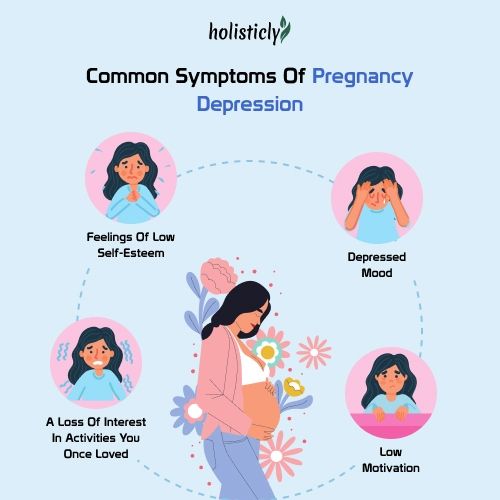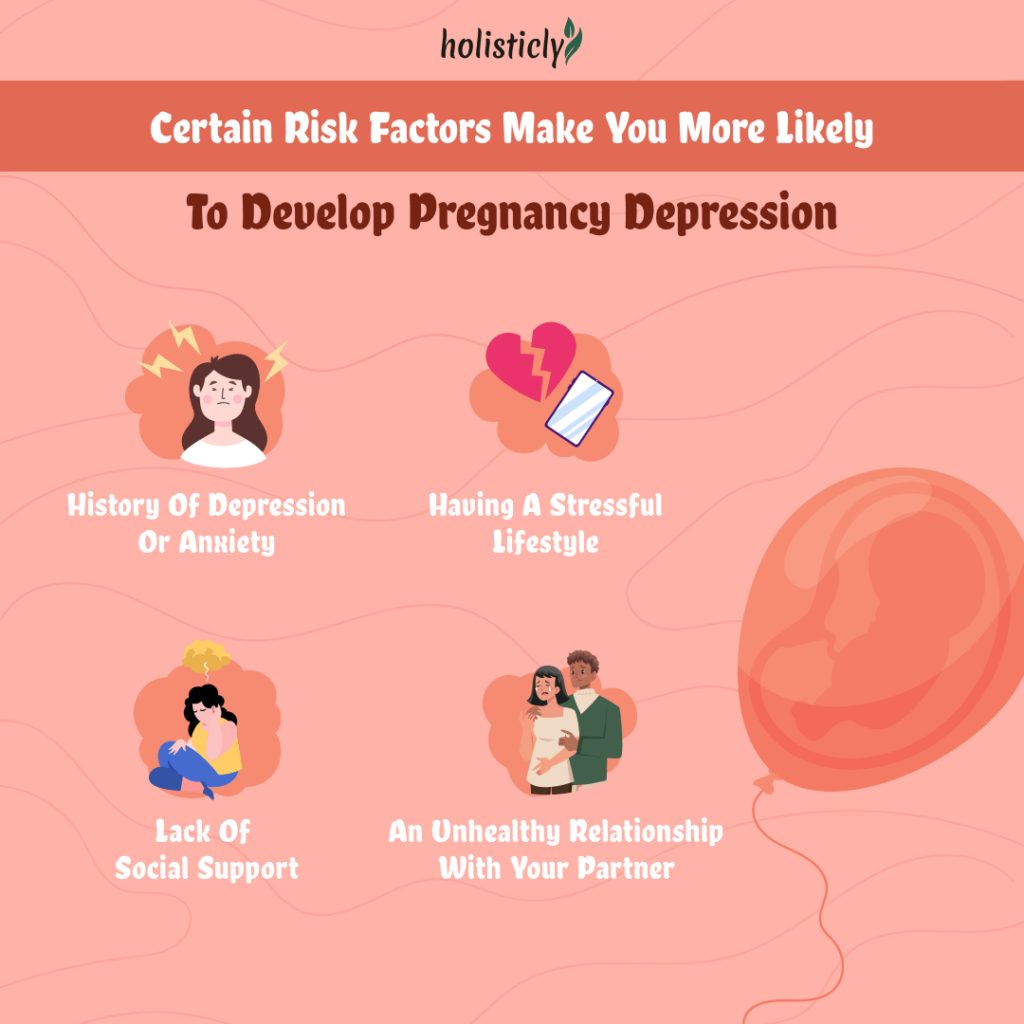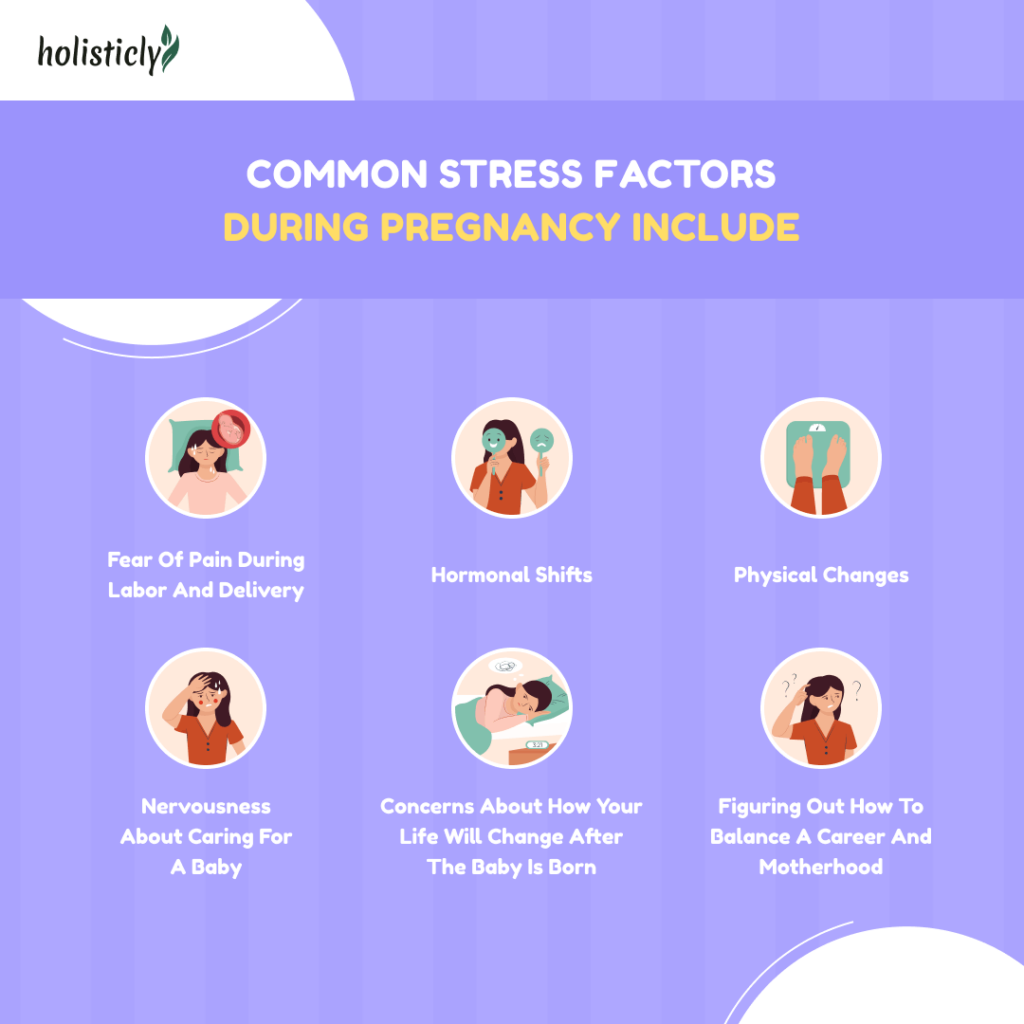By Sophia Deschler RN, BSN, RN | BSN
Updated on November 27, 2023
Published on October 20, 2023
Fact Checked

Get latest news, updates, and trends on mental well-being

People often talk about the joys of pregnancy, but not many share their challenges, like pregnancy depression. As a woman, you should know that depression during pregnancy is possible. Understanding this can help you prepare and take steps to prevent it.
Finding out you are pregnant comes with a huge rush of complicated feelings and emotions, which are difficult for most women to process. On top of that, you’ll have to deal with physical changes and hormonal shifts. All of these factors can interfere with mental health and lead to depression.
If you are experiencing depression during pregnancy, you are not alone. Many women deal with constant sad feelings during pregnancy. Just because you aren’t feeling your best while pregnant doesn’t make you any less equipped to raise your child.
Depression and stress during pregnancy go hand in hand. If you’re dealing with poorly managed stress, it can make depression harder to manage. It is essential to take steps to deal with depression and stress during pregnancy so that you can go into motherhood feeling your best.
This article will share more about depression and stress during pregnancy and the steps to overcome it.
Pregnancy depression (or perinatal depression1) is a form of depression explicitly associated with pregnancy. Research suggests that about 7% of women2 deal with depression during pregnancy, but the numbers may actually be higher due to unreported cases.
Many women feel nervous about telling family and friends that they are depressed during pregnancy due to a fear of being judged. Also, some women assume that their depression is just a part of the mood changes that come with pregnancy, so they may not even realize they have it.
Many common signs of pregnancy also coincide with symptoms of depression, such as changes in sleep, appetite, and mood. It is important to speak with your healthcare provider if you think you may have depression so they can recommend the best treatment approach.
Identifying depression during pregnancy allows you to seek treatment, preventing the condition from worsening.
Common symptoms of pregnancy depression2 include:

Certain risk factors2 make you more likely to develop pregnancy depression

It is normal to feel a little stressed out during pregnancy. You are embarking on a new journey, and you probably have endless questions that need answers.
However, if you manage stress poorly, it can begin to interfere with your mental health and may even lead to issues like depression.3
Healthy coping methods help to prevent stress levels from getting out of hand.
There are a lot of different things that can lead to stress during pregnancy. The fact that you are pregnant can be a stressor in itself. Pregnancy also causes changes in your physical body as well as your hormones. This can definitely cause stress during pregnancy.
Common stress factors during pregnancy include:

Poorly managed stress can exacerbate feelings of depression.4 It can worsen depression since it often causes negative thoughts and feelings. Stress can also interfere with healthy habits like sleep, which definitely hinders mental health.
There is a vicious cycle of stress and depression. This occurs when stress and depression feed into each other because they are not managed properly. If you are chronically stressed, you may start to feel hopeless. This feeling can make depression worse.
Being depressed may cause you to isolate yourself from others or make unhealthy lifestyle choices, making feelings of stress even worse. To break the stress and depression loop, you may have to make lifestyle changes and seek professional support.
It is crucial to find healthy ways to cope with depression during pregnancy since this will support your and your baby’s health, ensuring a smoother transition into motherhood.
For some, coping with pregnancy depression may be as simple as making some minor lifestyle changes such as getting more rest, doing some light exercise daily, and spending time with the people you love.
However, if your depression is not getting better even when you are taking care of yourself, you may need professional support.
Common treatment5 options for pregnancy depression include:
It is important to talk with your doctor about the risks of taking medication for depression during pregnancy. Some antidepressant medications may be safe during pregnancy but still have certain risks. Never start or stop taking any medications without your provider’s guidance.
Managing your stress during pregnancy can make a big difference in helping you prevent depression and feel your best.
Some stress management techniques6 you can try are listed below.
Postpartum depression occurs when you experience depression after having your baby. It is common to feel a sense of “baby blues” immediately following pregnancy as your hormones shift.
However, if feelings of depression go beyond 6 weeks postpartum, you may have postpartum depression.
Postpartum depression6 differs from pregnancy depression because it happens after pregnancy rather than during it.
Coping with postpartum depression will look different for everyone. Some women require professional interventions, such as medications and therapy. Others can manage symptoms with lifestyle adjustments.
Therapy can help you cope with postpartum depression by allowing you to discuss the challenges you are facing, and your therapist can provide suggestions on how to cope in a healthy way.
Some women require medication to help with postpartum depression. Talk with your doctor about your options.
Certain lifestyle adjustments that may help with postpartum depression include:
It is important to find ways to cope with postpartum depression. Postpartum depression that goes untreated can worsen and may even have a negative effect on the family as a whole.
Therapy is an effective professional treatment for pregnancy depression and postpartum depression. Doctors use a variety of therapeutic approaches7 to help women who struggle with depression related to pregnancy and postpartum, including:
Speaking to other people who are also struggling with similar challenges can be a helpful way to deal with pregnancy or postpartum depression. You may be able to find a local support group in your area with other women who are dealing with the same issues. If you cannot find an in-person group, look for pregnancy depression forums or online pregnancy support groups.
Pregnancy depression sometimes goes unnoticed, but it should never go untreated. Even though you can’t fully control how enjoyable your pregnancy is, you can improve your mental health to make it a little bit easier on yourself.
It is crucial to seek professional help to manage your symptoms and ensure a smooth transition into motherhood.